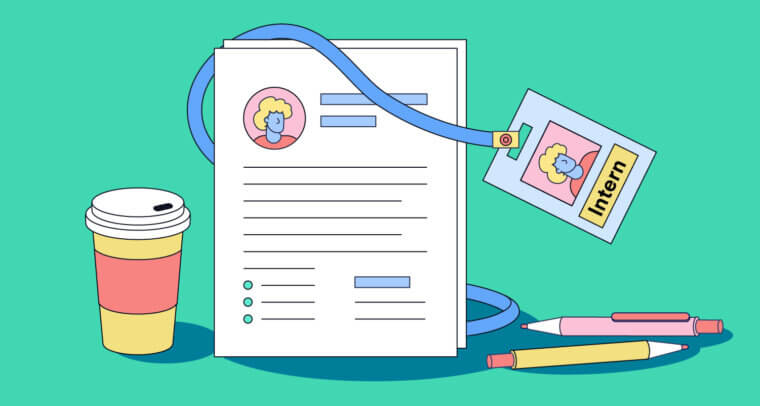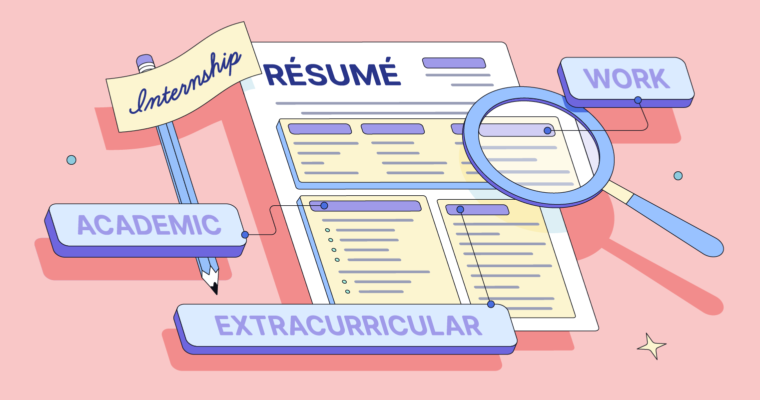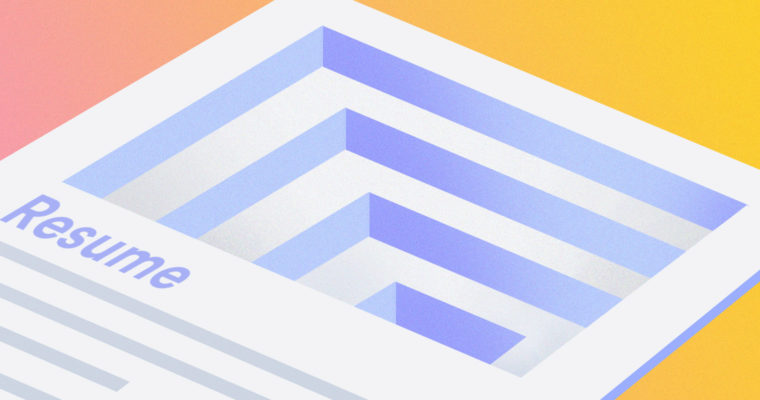
A cover letter for an internship, also called a letter of introduction, an application letter, or a personal statement, expresses how your skills and experiences make you the best candidate for the position. It should showcase your personal style while expanding upon and complementing your résumé.
Always include a cover letter when it is requested to solidify your chance of becoming a candidate for the internship. Conversely, including a cover letter, particularly when it’s optional, gives you an edge over candidates who don’t submit a cover letter. Consider the following guidance, tips, and examples before presenting your skills and experience to hiring managers.
Speed up the job application process with Grammarly’s AI cover letter generator, which helps you create a standout cover letter in three quick steps.
How to format your cover letter and what to include
Contact information and date
In the header or upper left-hand corner of the page, include your name and contact information and then that of the recruiter or hiring manager, followed by the date.
Your Name Berkeley, CA (000) 000-0000 no_reply@berkeley.edu linkedin.com/in/myname
Recruiter’s Name or Title [Recruiter’s position if name is provided] Company Name Anytown, USA
March 4, 2022
Greeting and introduction
First impressions are important, and this holds true for your letter. Avoid common mistakes by keeping the recruiter or hiring manager foremost in your mind. Begin with “Dear” or an appropriate title, like Mr., Ms., or Mx., followed by the individual’s first and last names.
Avoid impersonal greetings, like “To Whom It May Concern,” or casual greetings, like “Hey” or “Hi.” You want to strike a personal yet professional tone.
After the greeting, include in the first sentence the position to which you are applying, followed by how you discovered the internship, then express your interest in the company.
Example:
Dear Ms. Reader,
I am writing to express my interest in the Editorial Internship at Firtree Magazine. I’m a subscriber, and Firtree’s content ignited my interest in environmental justice journalism. I was excited to see the editorial internship opportunity listed on Handshake, my university’s job database.
Content paragraphs
Your cover letter should have two to three body paragraphs that cover the following information:
Reason for applying
Most students seek internship opportunities to jump-start their careers, while others may seek internships to discover potential career paths that are related or unrelated to their course of study. In a few sentences, explain how your personal and academic experiences lend themselves to the company’s or organization’s objectives.
Example:
As a computer science major, I believe in Google’s informational access initiative. I’m particularly interested in user experience and how usability and accessibility are interconnected. I would be glad to use my strong coding abilities to help the company expand and deepen this area of research and development.
Relevant skills or experience
Identify academic skills and experiences to add to your cover letter. You might pull relevant experience such as:
- Research assistantships or fellowships
- Conference or symposium presentations
- Participation in scholastic competitions
- Occupying a leadership or other significant role in a club or campus organization
- Campus jobs (e.g., school news reporter, library assistant, resident assistant, etc.)
- Membership and participation in student organizations
You could also describe the skills you acquired through extracurricular experiences or coursework. These can include soft skills, like leadership or multitasking, and hard skills, like coding, Python, HTML, or proficiency with the Adobe Creative Cloud or Microsoft Office Suite.
Example:
As the social media lead for the University of Michigan’s Writing Center, I frequently use Photoshop and Premiere Pro to produce brand-specific content. I release five to ten social media posts a week using the Creative Cloud.
Your intended contribution and goals
Do your homework on the company and role to identify how you could contribute and be an asset to the team. Explore the company’s website or its reviews on sites like Glassdoor to get a sense of its culture, values, and mission. Also, state why you want to intern for the company regarding what you hope to learn or gain.
Example:
I’ve noticed Pixar’s increased focus on films with characters of varied abilities. I think my two years as a research assistant working with neurodivergent children could help enhance the information Pixar’s content producers are seeking while providing me valuable hands-on experience for a career in the film industry.
Conclusion and sign-off
To conclude the letter, reiterate your excitement about the internship opportunity and invite the hiring manager to discuss your application further.
Wrap up the letter with a sign-off followed by your signature. Appropriate sign-offs include: “Sincerely,” “Best wishes,” “Kindly,” or “Thank you.”
Example:
I look forward to learning more about the design internship and welcome the opportunity to further discuss my application and suitability for the role. You may reach me at no-response@gmail.com or over the phone at (000) 000-0000.
Sincerely,
Devon Reader
How to handle little or no related experience in your cover letter
If you don’t have much related experience, be flexible. In instances where you have little experience, consider an unpaid part-time internship that can fill the gap. You may want to hold off on internships with “required/preferred qualifications” or “would love to see” in the job description since these might limit your competitive chances.
When crafting your cover letter, get creative about how you talk about what you’ve done, whether it’s problem-solving an issue at school or otherwise, organizing or facilitating an event, or starting a new group or game—these are all experiences you can bring to an internship. Use your cover letter to make a good impression, tout your qualifications, and demonstrate why you deserve consideration.
Identify transferable skills
Transferable skills are abilities you can easily take from one job to another. You can identify your transferable skills by generating a list of experiences from your responsibilities, like caregiving or babysitting, volunteer experience, or courses you took related to your major. Beneath each respective listing, note the hard and soft skills you successfully used.
Choose appropriate experiences
Once you’ve generated your list of skills, identify the required skills in the job description and look for correlations. Did participating in a group project improve your communication skills or ability to work effectively on a team? Have you cultivated skills that help you multitask and resolve conflict with poise? Depending on the internship’s expectations, match one or two experiences from your list to those listed in the job description.
Sell your story and skills
In your cover letter, discuss the specific experiences that show you have comparable skills to do what the job requires. Let hiring managers know how you made a difference or overcame a challenge and how those skills apply to the role.
Example:
In my economics class, I led a group of four peers to construct and present a product where I focused on delegation and team support. I shared praise and provided constructive criticism. My actions helped us work collaboratively, and we earned an “A” on the assignment. My interpersonal skills and open approach to teamwork make me a strong candidate for the Communications Internship.
Internship cover letter guidelines
Your internship cover letter should be:
- Half a page to one page long
- Single spaced with 1-inch margins
- Written in 10–12 point font (Times New Roman, Arial, or Calibri)
- Submitted as a PDF for electronic or email submissions unless otherwise instructed
- Printed on US letter size paper (8.5 by 11 inches) if mailing
Perfecting tone
Tone conveys your attitude about a given topic or subject. Aim to present yourself as professional, likable, and genuinely interested in the company. For an internship cover letter, aim for a tone that is professional yet friendly.
Getting tone right can be difficult. Fortunately, Grammarly’s tone detector can help you nail the appropriate tone and ensure you come across as intended.
When to follow up
It’s tempting to ask for a status update about your application, but before you do, double-check the job description. Confirm when the application period closes, if applicants are asked not to inquire about status updates, whether a response date is provided, and submission portal updates. Requesting an update too soon or when it’s not advised may make you come across as impatient or as someone who didn’t bother to read all of the application information.
According to one study, inquiring “one to less than two weeks” is an appropriate time to reach out. Call or email the point of contact and politely inquire about the status of the application process.
Example:
Dear [Hiring Manager’s Name],
Approximately two weeks ago, I submitted my application for [Internship Title] and wanted to inquire about the status of my application and/or learn when a decision will be made.
Please let me know if additional information is needed. I look forward to hearing from you.
Kindly,
[Name]
Sample internship cover letter
Jane Smith Berkeley, CA (000) 000-0000 no_reply@berkeley.edu linkedin.com/in/janesmith
Ms. Ronny Reader Hiring Manager Firtree Magazine Los Angeles, CA March 4, 2022
Dear Ms. Reader,
I am writing to express my interest in the Editorial Internship at Firtree Magazine. As an avid reader, John Forrest’s 2019 article, “Not Only the Land Is Burned by Forest Fires,” sparked my interest in environmental justice journalism. Naturally, I was excited to see Firtree’s Editorial Internship opportunity listed on UC Berkeley’s Handshake job database, knowing Firtree’s commitment to climate justice aligns with my career interests.
I am currently a junior pursuing my bachelor’s degree in English literature at Cal, which has strengthened my written communication skills. This is evident in my 3.85 grade point average and consistent placement on the dean’s list for the past three semesters. I work as a staff writer at The Daily Californian, Cal’s student-run paper. As a staff writer, I produce articles on a bi-weekly basis. Producing at this level in tandem with my coursework has sharpened my time management skills. Pitching on a weekly basis has strengthened my creative thinking and ability to stay abreast of current ecojustice news. My skill set aligns with Firtree’s goal of delivering interesting, informed content to your audience.
Outside of academics, my volunteer experience has cultivated my interpersonal skills. Each week I tutor in writing at the local high school, which has taught me to communicate complex ideas effectively and engage with different learning styles and backgrounds. I believe this experience will help me communicate with my peers at Firtree and with interview subjects in the field.
Having the opportunity to intern with Firtree would allow me to gain hands-on editorial experience to prepare for a full-time journalism career while contributing to Firtree’s continued success. I welcome the opportunity to further discuss my application for clarification or questions related to my experience. You can reach me at (000) 000-0000 or by email at no_reply@berkeley.edu.
Sincerely,
Jane Smith
Polished, mistake-free writing
Every writer needs feedback on their work, and cover letters are no exception. You want the hiring manager to see your experience and personality in your internship cover letter, not grammatical, spelling, and punctuation mistakes. To ensure your writing shines, use Grammarly to help catch typos, get rid of repetitive wording, and strike the right tone.
Internship cover letter FAQs
What is an internship cover letter?
An internship cover letter is a personalized letter that demonstrates a student’s or recent graduate’s suitability for an internship position based on relevant skills and experience.
What should an internship cover letter include?
An internship cover letter should include reasons for applying, appropriate skills and relevant experience, intended contribution to the company, and the applicant’s goals/desires.
What if the applicant lacks experience?
If an applicant has little or no related experience, draw from volunteer work, personal duties, and/or engagement and performance in relevant coursework to discuss applicable transferable skills. Find examples of your skillset inside and outside of the academic setting, be it sports, babysitting, event planning, or organizing groups or games.
How do you format an internship cover letter?
The cover letter should be formatted and organized to include the following in a single-page document:
- The applicant’s and hiring manager’s contact information and the date of the letter
- Greeting/salutation
- Opening paragraph
- Body paragraph showcasing applicant’s suitability for the position
- Closing paragraph
- Sign-off






